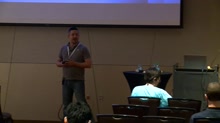CppCon 2015 `for_each_argument` explained and expanded--Vittorio Romeo
 Have you registered for CppCon 2016 in September? Don’t delay – Registration is open now.
Have you registered for CppCon 2016 in September? Don’t delay – Registration is open now.
While we wait for this year’s event, we’re featuring videos of some of the 100+ talks from CppCon 2015 for you to enjoy. Here is today’s feature:
`for_each_argument` explained and expanded
by Vittorio Romeo
Summary of the talk:
During January 2015, Sean Parent posted a very interesting short piece of code on Twitter. The code iteratively iterates at compile-time over any number of function arguments, forwarding them one by one to a callable object.
How does this code work? What are the possible use cases? Can we make it even more generic and useful?
My talk answers all of the questions above, using independently compiled chronologically sequential code segments that show the audience the analysis and improvement process of `for_each_argument`.

 Have you registered for CppCon 2016 in September?
Have you registered for CppCon 2016 in September?